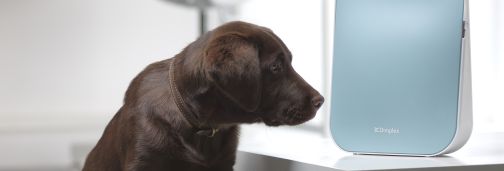Keeping Hay Fever at Bay

What is Hay Fever?
Hay fever is a common name given to allergic rhinitis, an inflammation of the nasal lining following contact with an allergic trigger. Many people suffer from seasonal rhinitis, occurring during the spring and summer months of the year. It occurs as a reaction to pollen from grass, trees and weeds, and can affect adults and children alike. Whilst hay fever is only considered a summer problem by many, symptoms can occur all year round for sufferers of perennial allergic rhinitis, which is a reaction to indoor allergens like house dust mites, pets or moulds.
Fighting Back
There are various medical treatments available to hay fever sufferers, such as antihistamines sprays and tablets, and you should consult your pharmacist for the best treatment for you. However, there is no cure for allergic rhinitis, so whilst medical treatments can ease the symptoms, it is equally important to take measures to prevent your exposure to hay fever allergens wherever possible.
Websites such as the Met Office make it easy to stay aware of pollen counts, and the NHS offers a range of guidance for helping to prevent hay fever, recommending wraparound sunglasses to stop pollen getting in your eyes, and showering and washing clothes regularly. They also advise not drying clothes outside, as they can catch pollen carried on the breeze, and even suggest you stay indoors and keep windows and doors shut as much as possible.
This can of course go against the grain; our natural desire is often to go outside and make the most of the summery weather, particularly in the changeable climate we’ve had over the last few months. But there are ways to ensure your home environment stays comfortable in the summer weather, and this can make shunning the sunshine feel like less of a punishment.

Dealing with Dust
So hiding away from the allergens carried on the breeze is all very well, but if you keep the windows and doors closed, how can you ensure a clean and fresh environment? The NHS also recommends using a vacuum cleaner with a HEPA filter to combat dust and allergens in the home, and there are other options available too.
An air purifier works by drawing in air from the room and passing it through a filter it to release fresher, cleaner air, helping to eliminate pollen, dust and other allergens. All Dimplex air purifiers include a HEPA filter as well as an ioniser, ensuring the best possible treatment of the air in your home.
As its name suggests, the Dimplex Ion Fresh tower fan also incorporates an ioniser function, discharging negative ions which attach to positive ions on dust particles and other allergens, forcing them to drop to the floor. This can help ensure the indoor environment is cool and lessen the risks of allergies at the same time.

Managing Moisture
Drying your clothes indoors protects them from being covered with allergens carried on the breeze, but can increase the humidity in your home, particularly if you’re keeping the house closed up as the NHS advises. This increases the potential for mould build up in the home, which is itself an allergen that can cause hay fever symptoms.
Investing in a dehumidifier can not only help protect against the build-up of mould and condensation, but can also speed the drying of your clothes as well. The EverDri range from Dimplex offers a range of features including an active carbon filter to capture dust and reduce odours. The benefits of a dehumidifier can be felt throughout the year, not just in the hay fever heavy summer months. Condensation can be a common problem as winter sets in and you turn the heating back on, and this increased humidity makes preventing mould an important part of keeping your home environment clean and comfortable.

A Perennial Problem
As mentioned above, for those who suffer from perennial allergic rhinitis can experience hay fever symptoms throughout the year. Fortunately, whilst the cause of the allergic reaction is different, the solutions can be the same. An air purifier or dehumidifier can be a boon in the summer season, but throughout the rest of the year they can help you combat indoor allergens like house dust mites, pet dander and mould particles, as well as keeping the air in your home clean and fresh.
As we move into the summer, high pollen counts will become more common. Now is the time, therefore, to take steps to keep your home allergens free to ensure you stay comfortable and breathe easy all the way to the autumn.
If you’ve found this article helpful, why not share it with your friends and family using the links below?








